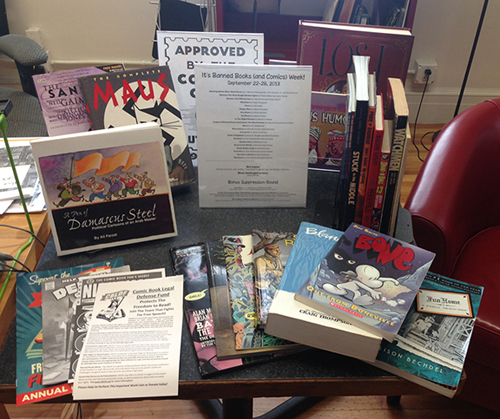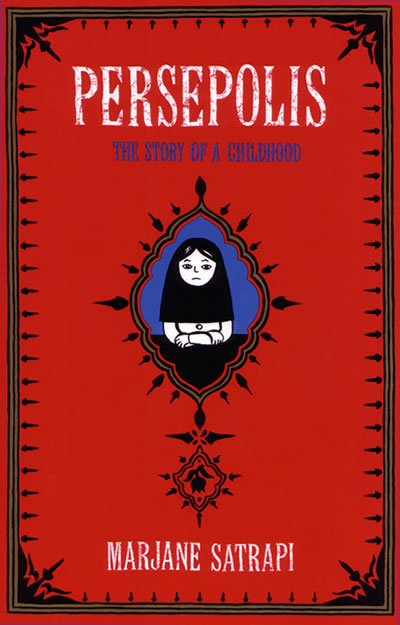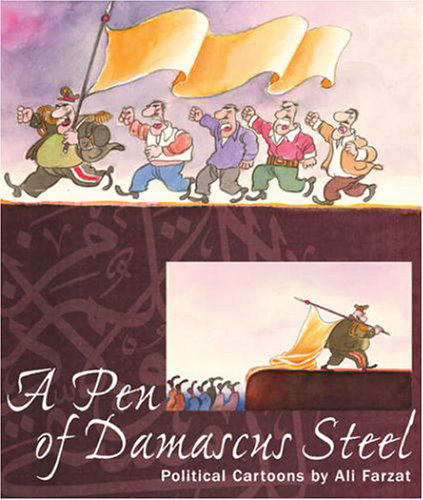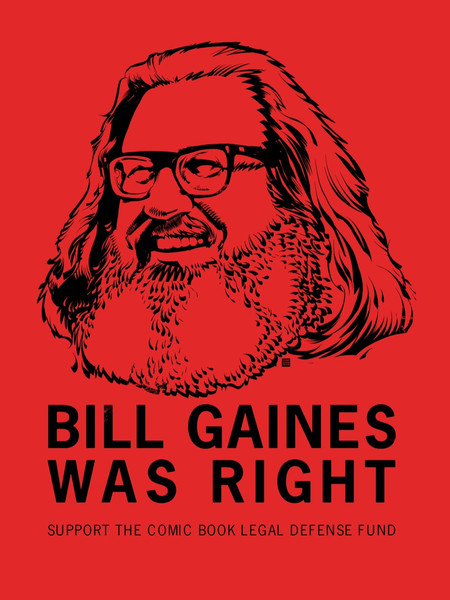The American Library Association’s annual Banned Books Week celebration runs from September 22nd through the 28th this year, and we’re taking the opportunity to showcase hot items in the library. Last year CCS and the Schulz teamed up with the Comic Book Legal Defense Fund (CBLDF) to add a permanent Banned Comics section to the collection, and there’s news and a handful of new books to highlight. (For those curious about why this is an ongoing issue, there’s a general rundown at the end.) Let’s get to it!

Comics or contraband? Notable unseens: Tank Girl, In the Night Kitchen, Ice Haven, and The Color of Earth.
It’s hard to get far on comics censorship without mentioning Dr. Fredric Wertham, who penned the popular 1954 exposé Seduction of the Innocent, and in February Professor Carol Tilley of the University of Illinois revealed that—based on Wertham’s own notes—he fudged much of his data. That was big news, and we’ll get into why shortly.
Marjane Satrapi’s award-winning memoir Persepolis was removed from Chicago Public Schools in March and joined fine company on the Banned Comics list, which features such other landmarks as Maus, Bone, Fun Home, Sandman, Watchmen, and Stuck Rubber Baby. The move contradicted their own curriculum, incited widespread irritation, and was made fuzzy by quick emails from CPS to “clarify” its position. This apparent backtrack was met with deep skepticism. (Perhaps most interesting: CPS stated that the book will still be available in school libraries, and a spokesperson for the Chicago Teachers Union pointed out that 160 of their schools don’t have libraries.)
In addition to Persepolis, we’re including suppressed comics for the first time—works that don’t make it into libraries or even trigger violence against their creators. Alan Moore and Melinda Gebbie’s pornographic Lost Girls is often omitted from collections (and stores) despite Moore’s renown, and its international distribution has been uncertain. In 2011, famed Syrian political cartoonist and publisher Ali Farzat‘s hands were broken by masked gunmen, and A Pen of Damascus Steel introduces his work to Western readers. Finally, the hard-to-find Impact of Serious Humour collects work by Nigerian artist and editor Albert Ohams, whose visit to CCS last year made quite an impression; during the dictatorship of General Sani Abacha, he had to leave the country. For more information on suppressed speech and human rights, check out Amnesty International’s Banned Books Week resources.
Now back to Wertham, and our industry’s long history of censorship: Comics with sexual content, nudity, profanity, violence, and/or GBLTQ themes are frequently challenged in libraries thanks to the still-widespread misconception that they’re only meant (or suited) for children. This stigma has followed American comics at least since the 1954 Senate subcommittee Juvenile Delinquency Hearings, where the medium was scapegoated for leading our nation’s youngsters astray. Dr. Wertham was a key witness in these hearings, which is why Prof. Tilley’s research into his papers has been such a big deal.
The hearings and ensuing public pressure led a handful of publishers to create the recently-defunct Comics Code Authority, a watchdog group that reviewed all comics before printing. (You may recognize their Seal of Approval, which now belongs to the CBLDF.) Nearly all publishers bowed to their regulations—Dell Comics was a notable holdout, relying on its own strong reputation—and it kept horror and crime comics out of the marketplace. This put major competitor EC Comics out of business despite the now-legendary creative chops of its writers and artists, and even initially rejected a 1970 issue of DC Comics’ House of Secrets for the writer’s surname: Wolfman.
Long story short, mature themes were erased from comics for decades—either from direct censorship or the chilling effect the Code had on what folks were willing to risk publishing. The underground comix revolution of the 1960s and ’70s is arguably a backlash against this suppression, and that’s a post for another day!
Katie Moody
Librarian, the Center for Cartoon Studies





















